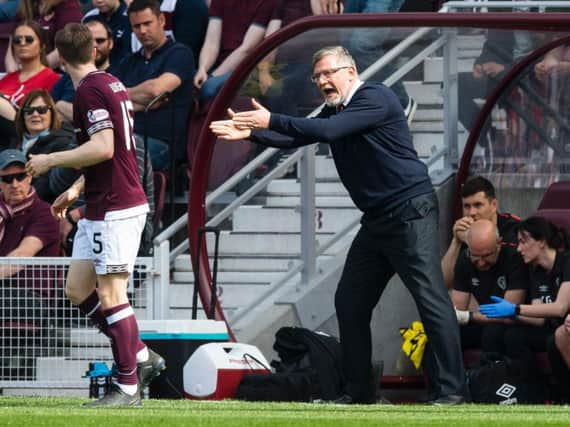Hearts aren't a long ball team - but maybe they should embrace the stereotype


With the game approaching the quarter-hour mark at a sun-baked Tynecastle, John Souttar fired a pass into Craig Wighton who had drifted infield. The forward, slow and unaware, was sacked by Rangers full-back Jon Flanagan. The ball hit the back of the net through Jermain Defoe five seconds later.
It was a case of deja-vu as Rangers went two ahead before half time. Michael Smith played a short pass to Arnuad Djoum, who shifted it to Oliver Bozanic, but the Australian was ponderous, not taking the nature of the game into account, and was dispossessed by Ryan Jack.
Advertisement
Hide AdAdvertisement
Hide AdAgain, it took just five seconds for the ball to hit the back of Zdenek Zlamal's net, all but ending any chance of Hearts picking up a point, let alone three.
Two instances of Hearts trying to play through the middle of the pitch and twice they were punished.
Therefore it was slightly surprising to hear Christophe Berra come out after the match and have to refute suggestions that Hearts are a long ball team.
“That is a theory, aye [we are long ball],” he said. "But I’m sure there is a stat that showed we were third-lowest with the long ball. I don’t know if that’s maybe something that comes along with the gaffer. It’s not our aim to do that. It is an asset… I’m sure Aberdeen play it long to the big man up front.”
He added: “People have maybe got a perception of the manager which is not the way we plan to do it. Like most teams, you want to put pressure on and that can be hard to handle but I’m sure that stat would shut up a few people."
It follows similar comments made manager Craig Levein earlier this month with regards to Uche Ikpeazu.
“I had to laugh when that came up,” he said. “Sometimes we do play long ball. Absolutely. We’ve got Uche in the team because he’s good at getting us from point A to point B. The perception is that’s all we do. I completely disagree with that.”
Long-ball Hearts is a stereotpye which has stood for years and confirmation bias may come into it. Viewers expect Hearts to play a long ball so when it happens, no matter how often, it only reinforces the idea, as opposed to Hibs or Aberdeen.
Advertisement
Hide AdAdvertisement
Hide AdWithout wanting to come across as "hipster", let's delve into the Wyscout stats Levein has mentioned this month.
Only Celtic and Rangers play fewer long passes per 90 minutes than Hearts in the league, and the Gorgie side have the third-highest accuracy.
On an individual basis there are only two Hearts players in the top 30 for long passes - Zdenek Zlamal and John Souttar.
As a percentage, 15.5 per cent of Hearts passes 'go long'. Only the Old Firm and Hibs have a lower percentage.
Hearts aren't a long ball team. But they would probably get more joy if they did, especially at home.
Berra said after the Rangers defeat: "Obviously in the first five, ten, 15 minutes at Tynecastle against bigger teams, you want to put their defence under pressure. You want to get crosses and corners in. That’s the plan. You have to do that.”
Fans will argue that hasn't been the case in recent months. The ball being moved forward quickly, sometimes chucked down the opposition's throat, followed by a second and third wave of pressure, trying to suffocate.
There has been a belief, including this writer, that there is an over-reliance on Uche with Steven Naismith out. However, it may in fact be the opposite and that we are wrong and Hearts haven't been using him enough, especially for a fast start in Gorgie.
Advertisement
Hide AdAdvertisement
Hide AdHis mere presence spreads fear and uncertainty among the opposition defence. It can be anarchic and rough but can provide results.
Sandwiched between Rangers' first and second goals on Saturday, Zlamal had kicked long towards Uche. The Englishman towered above Nikola Katic to flick the ball on to Wighton who skewed his shout wide of the post.
"Route-one football from Hearts... an opportunity to level things up," Rob MacLean said in commentary on the BBC highlights.
It was the side's best chance before Steven MacLean's consolation effort.
The long-ball perception should make way for questions regarding how and where Hearts use the ball. Seven teams have made more passes to the final third than Levein's men, while St Mirren and Dundee are the only teams to have attempted fewer through balls.
Levein has previously noted the need for more creativity in the side, something which he plans to address in the transfer window, although something which perhaps should have been addressed previously.
As seen with the first two goals conceded against Rangers, especially the second, when Hearts try to play through midfield, it can be ponderous, timid and lacking in ambition. Players seem to procrastinate rather than be proactive. Hesitant decision making sees the ball go backwards, taking any vigour or momentum out of attacks.
The most creative of the midfielders - Arnaud Djoum - has played more of a defensive role with Peter Haring struggling with niggles, while Sean Clare is more about direct running than cutting defences open with his passing and vision.
The idea that Hearts are a "big, physical, route one team" is one which has stuck for well over a decade. For the final five matches of the season the team should perhaps embrace it.